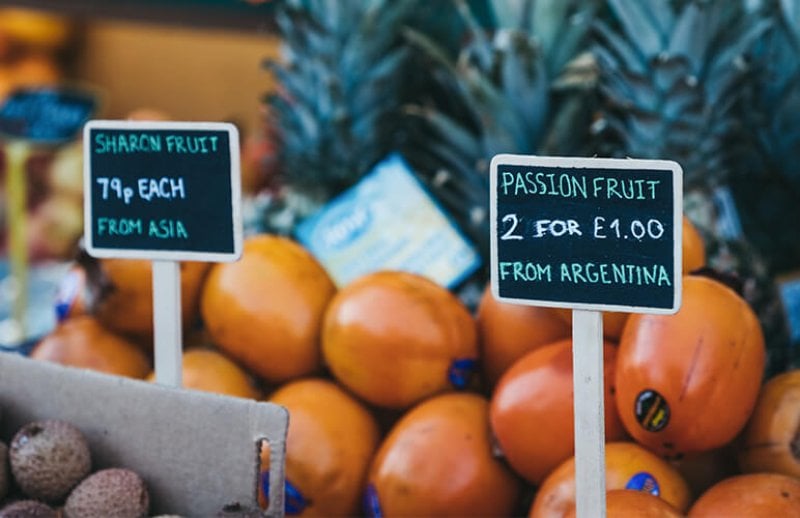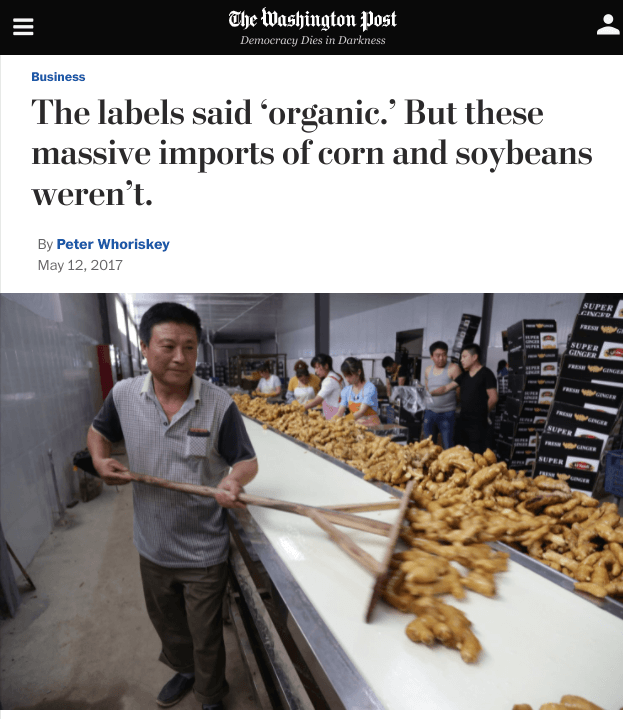I am a strong believer in consumer choice. Although I may not agree with every choice a consumer makes, it’s important that they have the right to make informed decisions. However, the issue is that many people are missing the ‘informed’ part of the decision-making process.
In today’s world it is so easy to get swayed by advertisements, poor journalism, social media campaigns and a barrage of opinions online. This may not be an issue when we’re talking about who makes the best pair of shoes, but it can have pretty drastic effects in the food world—and it’s rampant in the organic market.
Organic grains and produce still only make up 4% of food sales in the U.S., according to the USDA. Although the organics market is growing tremendously, it has some limitations. Organic food is more expensive than conventional grown food, which limits its market. One way grocers can combat the higher price of organic products is by importing cheaper produce from foreign sources.
While most food sold as “USDA Organic” is grown in the U.S., at least half of some organic commodities — corn, soybeans and coffee — come from overseas, from as many as 100 countries. We currently purchase more than $2 billion in organically certified agricultural products annually from around the globe.
Are ‘US organic’ and ‘imported organic’ products of equal value?
As far back is 2014, when University of Oregon professor Peter Laufer wrote Organic: A Journalist’s Quest to Discover the Truth Behind Food Labeling, reporters have noted the disconnect between public perception and reality
He was prompted to write the book when he read the labels of two products he had purchased: a can of organic black beans from Bolivia and a bag of organic walnuts, which turned out to be rancid, labeled “Product of Kazakhstan.”
“I’ve done a lot of work in the former Soviet bloc, and when you look at the ‘corrupt-o-meter,’ it doesn’t get much worse than Kazakhstan,” he told Dan Charles of NPR. Bolivia, he said, isn’t much better.
According to the Organic Farmers’ Agency for Relationship Marketing, an organic cooperative, 60%-70% of the agricultural products imported into the U.S. under the USDA-certified organic brand have the potential to be fraudulent.

Some problems arise with the origin of the produce. Although the United States does have certain requirements for imported organic produce, we still see many false claims moving through our ports. Imported organic produce and grains must come from a farm that has been certified by an agency recognized by the U.S. National Organic Program with similar requirements of their growers that the U.S. has.
Unfortunately, there are times foreign products have been moved from various other countries to an operation that is able to import organic products, these products are then sold as counterfeit organic goods.
“A lot of our imported, organic vegetables are coming from Mexico or Central and South America, said Wisconsin farmer John Bobbe, OFARM’s now-retired former executive director. “And there’s actually a couple different avenues for fraud in that regard,”
Washington Post investigation
In 2017, the Washington Post did a multi-part exposé (here, here, here), finding significant fraud not only in consumer products but in animal feed for the organic industry. Its investigation found that 36 million pounds of imported nonorganic soybeans and corn imported from Turkey suddenly obtained “organic” labels for domestic sale after entering California. According to the Post:
Under USDA rules, a company importing an organic product must verify that it has come from a supplier that has a “USDA Organic” certificate. It must keep receipts and invoices. But it need not trace the product back to the farm. Some importers, aware of the possibility of fraud, request extra documentation. But others do not.
“The U.S. market is the easiest for potentially fraudulent organic products to penetrate because the chances of getting caught here are not very high,” Bobbe told the Post. In Europe and Canada, he said, import rules for organics are much stricter.
The use of synthetic chemicals on organic imports is another issue. Upon inspection, if organic goods are found to have pests, the supplier is given an option to fumigate the container. Yet, the fumigants are often not on the approved list for organic products.
While imports are an important part of the U.S. food system, they do cause unique challenges for consumer confidence. Problems and corruption could occur at every point in the supply chain for imported organic products, especially with the potential for significant price increases when compared to the same conventional products.
It is impossible to gauge the full extent of the fraud in imported organics because there is no incentive for organic companies to monitor foreign suppliers, let alone report it. In addition, there is limited oversight. The certification that imported organic food meets U.S. standards is not done by the USDA but is outsourced to foreign regulators or USDA-authorized third-party organizations.
After the Post started reporting on the massive fraud, one of the nation’s largest organic inspection agencies, CCOF, issued a notice indicating that it “lacks confidence in the organic status of foreign grain.” CCOF announced it was requiring that all grain shipments trace back to growers. In 2018, the farm bill included measures designed to curtail fraud in organic imports, but it’s not clear how effective they have been.
Ensuring food integrity
So how can we instill greater confidence in our consumers that what they think their purchasing is actually true?
First, we can include more U.S. grown products in our grocery stores. When in season, United States grown produce should be the first option you see on the shelf. Although corruption and problems can still occur, it has been found to be less likely than imported produce.
Secondly, the USDA and other agencies tasked with enforcing our import regulations and inspecting incoming goods should be held to a higher standard. Negligence or corruption in these agencies should not be acceptable in any format, and should be punished accordingly.
Lack of consumer confidence in any food sector affects us all. If consumers believe they cannot trust the products they are purchasing in stores it will be a difficult time for all producers, as we currently see with the onslaught of attacks on various agricultural practices and industries.
As producers, we can help spread positive messages about our industry, but more importantly as consumers ourselves we can require that the suppliers and regulators uphold their part of the deal. We rely on the USDA and other organizations to maintain food safety in the U.S., and we must hold them accountable when failures occur.
Michelle Miller aka “The Farm Babe” is a full time advocate for agriculture. She is a contributing columnist for the GLP and AGDaily. An internationally recognized keynote speaker, writer, and online influencer, she is passionate about bridging the gap between farmers and consumers by giving science a bigger voice. Michelle resides on a timber farm in north central Florida. Learn more at www.thefarmbabe.com or on Twitter @theFarmBabe
































